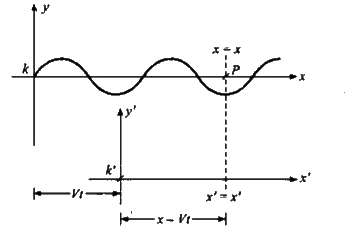A plane wave ζ=Acos(ωt−kx) propagates in the reference frame S. find the equation of this wave in a refreence frame S' moving in the +ve direction of x-axis with a constant velocity V relative to S.
The correct Answer is:[Acos[ω(1−Vv)t−kx']]
In frame k wave equation is
y=Acos(ωt−kx)
In frame k' waves velocity is v- V so motion equation for a point P is 
y'=Acos[ωt−k(x'+Vt)]
y'=Acos[ωt−kx'−kVt)]
y'=Acos[ω(1−Vv)t−kx']
Topper's Solved these Questions
- WAVES BOOK - PHYSICS GALAXY - ASHISH ARORACHAPTER - WAVES EXERCISE - Practice Exercise 6.2
11 Videos
- WAVES BOOK - PHYSICS GALAXY - ASHISH ARORACHAPTER - WAVES EXERCISE - Practice Exercise 6.3
11 Videos
- WAVES BOOK - PHYSICS GALAXY - ASHISH ARORACHAPTER - WAVES EXERCISE - Unsolved Numerical Problems for Preparation of NSE, INPhO & IPhO
135 Videos
- WAVE OPTICSBOOK - PHYSICS GALAXY - ASHISH ARORACHAPTER - WAVE OPTICSEXERCISE - Unsolved Numerical Problems
28 Videos
- X-RAYSBOOK - PHYSICS GALAXY - ASHISH ARORACHAPTER - X-RAYSEXERCISE - Unsolved Numerica Problem for Preparation
23 Videos
Similar Questions
An unstable particle moves in the reference frame K′ along its y′ axis with a velocity v′. In its turn, the frame K′ moves relative to the frame K in the positive direction of its x axis with a velocity V. The x′ and x axes of the two reference frames coincide, the y′ and y axes are parallel. Find the distance which the particle traverses in the frame K, if its proper lifetime is equal to Δt0.
View SolutionA train of length l=350m starts moving rectilinearly with constant acceleration w=3.0⋅10−2m/s2, t=30s after the start the locomotive headlight is switched on (event 1), and τ=60s after that event the tail signal light is switched on (event 2). Find the distance between these events in the reference frames fixed to be train and to the Earth. How and at what constant velocity V relative to the Earth must a certain reference frame K move for the two events to occur in it at the same point?
View Solution
Knowledge Check
A plane sound wave is travelling in a medium. In reference to a frame A, its equation is y=a cos (ωt−kx). Which refrence to frame B, moving with a constant velocity v in the direction of propagation of the wave, equation of the wave will be
Ay=acos[ωt+kvt−kx]By=−acos[ωt−kvt−kx]Cy=acos[ωt−kvt−kx]Dy=acos[ωt+kvt+kx]Two events occur simultaneously at separated points on the y axis of reference frame S. According to an observer moving in the positive x direction
AThe event with the greater y coordinate occurs firstBThe event with the greater y coordinate occurs lastCEither event might occur first, depending on the observer's speedDThe events are simultaneousA wave is represented by the equation y=0.5sin(10t−x)m. It is a travelling wave propagating along the + x direction with velocity
A10m/sB20m/sC5m/sDNone of these
In an inertial reference frame K there is only a unifrom electric field E=8kV/m in strength. Find the modulus and direction
(a) of the vector E' (b) of the vector B' in the interial refrernce frame K' moving with a constant velocity v relative to the frame K at an angle α=45∘ to the vector E. The velocity of the frame K' is equla to aβ=0.60 fraction of the velocity of light.
View SolutionThe frame K′ moves with a constant velocity V relative to the frame K. Find the acceleration w′ of a particle in the frame K′, if in the frame K this particle moves with a velocity v and acceleration w along a straight line
(a) in the direction of the vector V,
(b) perpendicular to the vector V.
View SolutionA particle moves in the frame K with a velocity v at an angle θ to the x axis. Find the corresponding angle in the frame K′ moving with a velocity V relative to the frame K in the positive direction of its x axis, if the x and x′ axes of the two frames coincide.
View SolutionObserver S reports that an event occurred on the x axis of his reference frame at x=3.00×108m at time t = 1.50 s. Observer S' and her frame are moving in the positive direction of the x axis at a speed of 0.400c. Further, x = x' = 0 at t = t' = 0. What are the (a) spatial and (b) temporal coordinate of the event according to S'? If S' were, instead, moving in the negative direction of the x axis, what would be the (c ) spatial and (d) temporal coordinate of the event according to S' ?
View SolutionThe velocity components of a particle moving in the xy plane of the reference frame K are equal to vx and vy. Find the velocity v′ of this particle in the frame K in the positive direction of its x axis.
View Solution
